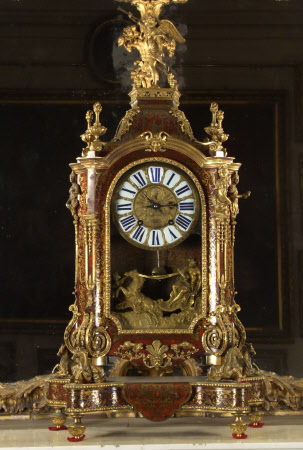Bracket clock
Nicolas Delaunay (1646 - 1727)
Category
Horology
Date
circa 1700
Materials
Tortoise shell, oak, gilt-brass, glass, enamel, brass, steel
Measurements
1070 x 560 x 250 mm
Place of origin
Paris
Order this imageCollection
Petworth House and Park, West Sussex
NT 485688
Summary
Eight day French bracket clock by Nicholas Delaunay, Paris, c.1710. Two-train, five-pillar going-barrel movement with verge escapement, silk pendulum suspension and count-wheel half-hour striking on a bell in the canopy above the movement. The backplate is signed: “AParis / Nicholas Delaunay” and the count-wheel is engraved with arabic hour numerals. The 23 cm diameter chased and engraved gilt-brass dial has white enamel hour plaques with dark blue roman numerals. The dial plate is engraved with arabic minutes on the periphery. The chased and engraved gilt-brass dial centre depicts Louis XIV above a crown and is flanked by military attributes. The fleur de lis and poker hands are in blued steel. The boulle-work case has an oak carcass and fine turtle shell and engraved-brass veneers with gilt-brass mounts. The top of the case is surmounted by a gilt-brass figure of Fame and the glazed front door is mounted, inside the glass, with a male figure in a chariot drawn by two horses. The case stands on four scrolling feet sitting on four horses, the whole then standing on a matching boulle-work base with gilt-brass feet. Note: Nicholas Delaunay is recorded as having worked in Paris up until his death in 1743.
Full description
A large French, Louis XIV (c.1700), boulle work bracket clock with ormolu mounts surmounted by an ormolu figure of Fame. The dial incorporates a profile portrait of the king. Signed by the Parisian clockmaker Nicolas Delaunay (d.1743). Verge escapement, countwheel striking.
Provenance
By descent, until the death in 1952 of the 3rd Lord Leconfield, who had given Petworth to the National Trust in 1947, and whose nephew and heir, John Wyndham, 6th Lord Leconfield and 1st Lord Egremont (1920-72) arranged for the acceptance of the major portion of the collections at Petworth in lieu of death duties (the first ever such arrangement) in 1956 by H.M.Treasury.
Makers and roles
Nicolas Delaunay (1646 - 1727), maker
